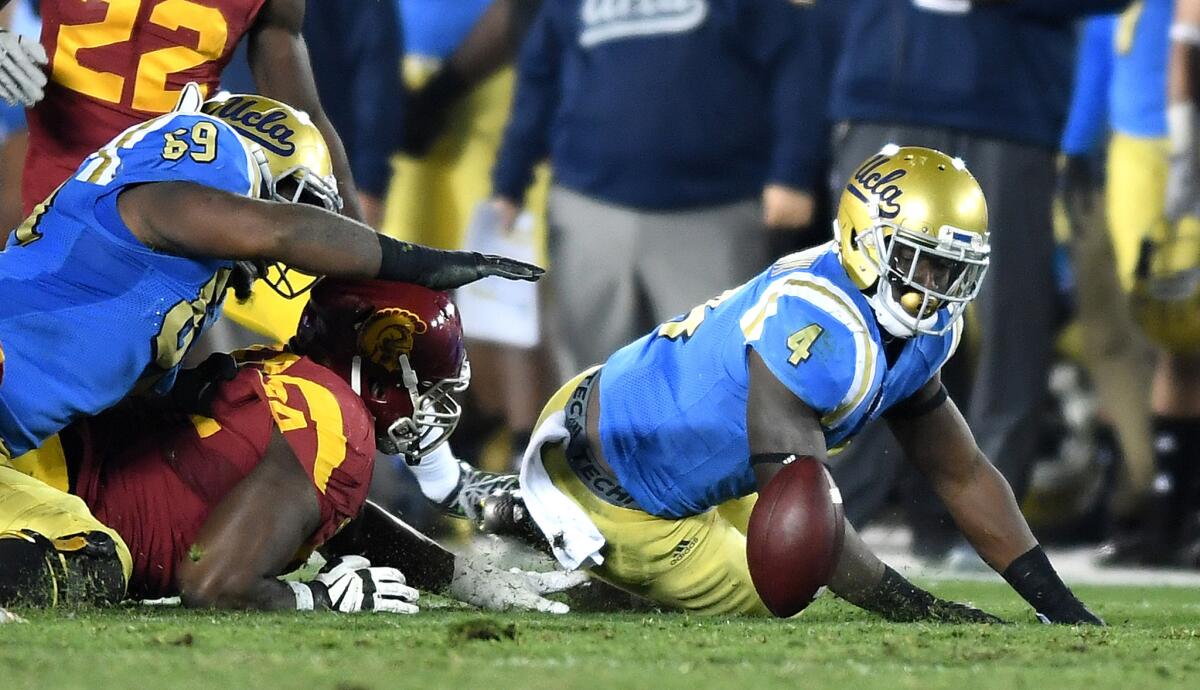As Bruins end disappointing season, future success might be a matter of style

- Share via
Reporting from Berkeley — The season will end soon enough for UCLA. There are no such assurances of finality to the major issues beleaguering the Bruins.
What is likely to be UCLA’s last game of the season Saturday against California at Memorial Stadium will not necessarily be the cutoff point for an inert running game, an erratic offensive line and a group of receivers responsible for more drops than a roller coaster.
The Bruins switched to a pro-style offense with hopes that it would accentuate quarterback Josh Rosen’s strengths while providing a power running game. It never happened. UCLA reverted to more of a spread look even before Rosen sustained a season-ending shoulder injury in early October, and then used it almost exclusively once backup quarterback Mike Fafaul took over.
The losses continued and the Bruins (4-7 overall, 2-6 in Pac-12 Conference) were left with a philosophical dilemma: What now?
“They just have yet to find the style of offense that fits this group of young men,” said ESPN analyst Mike Bellotti, the winningest coach in Oregon’s history before retiring after the 2008 season. “And regardless of whatever they say they want to do, it’s about putting your players in position to have success. That’s the No. 1 thing.
“It doesn’t matter if I say I’m going to run a pro-style, I’m going to run the spread, I’m going to run the wishbone. It doesn’t matter as long as you figure out what this group of young men can do and then play to their strengths.”
UCLA Coach Jim Mora said this week that he would analyze every aspect of the program, from technique to scheme to fundamentals to practice format to his coaching staff, before plotting a game plan for 2017. He didn’t sound like someone preparing to scrap every change the team had implemented.
“I don’t think we need a huge overhaul,” Mora said. “I think we need tweaks.”
Mora pointed to the close nature of his team’s defeats — five of the seven losses came down to the final play — as evidence the Bruins were not far from having the success they need to contend for the conference title.
But some modifications seem inevitable for a team that can finish no higher than fourth in the Pac-12 South.
All five tailbacks and emerging receivers Jordan Lasley and Theo Howard will be back next season, meaning the biggest changes on offense will come along the line. Left tackle Conor McDermott and center Scott Quessenberry will have exhausted their eligibility, leaving a line that was already in flux with further instability. It helps that right tackle Kolton Miller will return from the foot injury that has sidelined him since midseason.
Mora said the Bruins would try to bolster their returning group of linemen with a recruiting class that included graduate transfers. They were set to welcome former Texas center Jake Raulerson last summer before he was denied admission and ended up at Arkansas.
“The good football teams are going out and they’re getting graduate transfers and that’s the way you have to compete,” Mora said. “When you face the uncertainty of if guys are going to stay for their fourth year, you have to be prepared to get some veterans in, and that was our plan and unfortunately it didn’t work out for us and it absolutely hurt us.”
Mora also has decisions to make about the future of his assistant coaches, particularly at the positions where players have vastly underperformed. He said he needed to be “methodical and thoughtful,” even in the wake of a season that has fallen so far short of expectations.
“I think knee-jerk reactions oftentimes backfire, but that doesn’t mean that you’re not open to change,” Mora said. “I think you always have to be open to getting better and whether that means making changes or it means wholesale changes or tweaking the way you work as a staff together or the way you teach or how you recruit.”
Sometimes the parting of ways among coaches is mutual. Bellotti said Oregon offensive coordinator Andy Ludwig chose to leave after the 2004 season when Bellotti decided to switch from a pro-style offense to the spread because Bellotti felt it would better protect the Ducks’ quarterback.
Oregon doubled its win total in 2005, going 10-2, while appreciably improving in all offensive categories.
Bellotti said Rosen has the talent to succeed in whatever style of offense UCLA decided to run but cautioned that significant changes such as the ones the Bruins made this season can take a while to operate smoothly.
“Oftentimes, from a strength program and a few other things,” Bellotti said, “it takes a couple of years of recruiting and a couple of years of development within the program to put together the style of player that you want.”
Mora and the Bruins do not have the luxury of indefinite tinkering. Rosen is widely expected to enter the NFL draft after 2017 and Mora could need a bounce-back season to keep his job after going 5-10 since the middle of last November.
UCLA conceivably could go to a bowl with a victory over the Golden Bears (4-7, 2-6) on Saturday, but in many ways 2016 can’t end quickly enough.
“Obviously, it was very disappointing,” Mora said, “but I think we can get right back on top very quickly.”
Twitter: @latbbolch
Go beyond the scoreboard
Get the latest on L.A.'s teams in the daily Sports Report newsletter.
You may occasionally receive promotional content from the Los Angeles Times.




